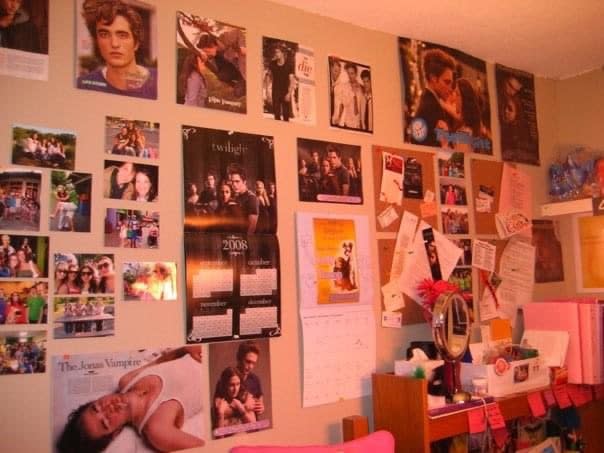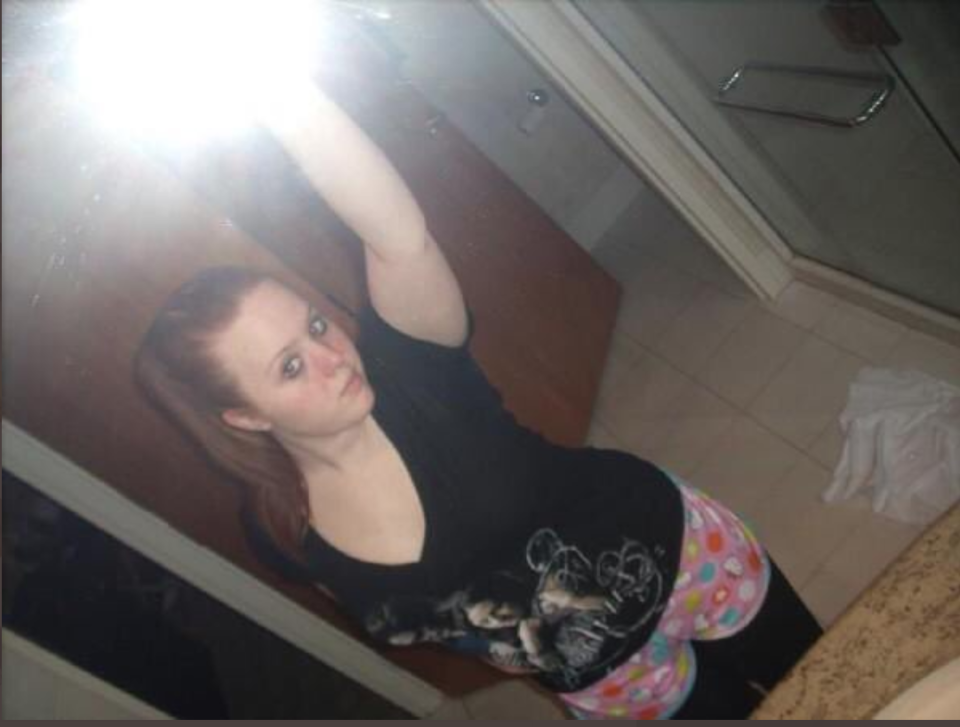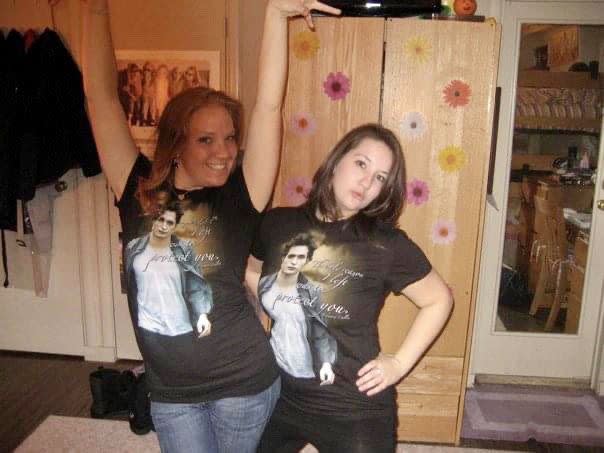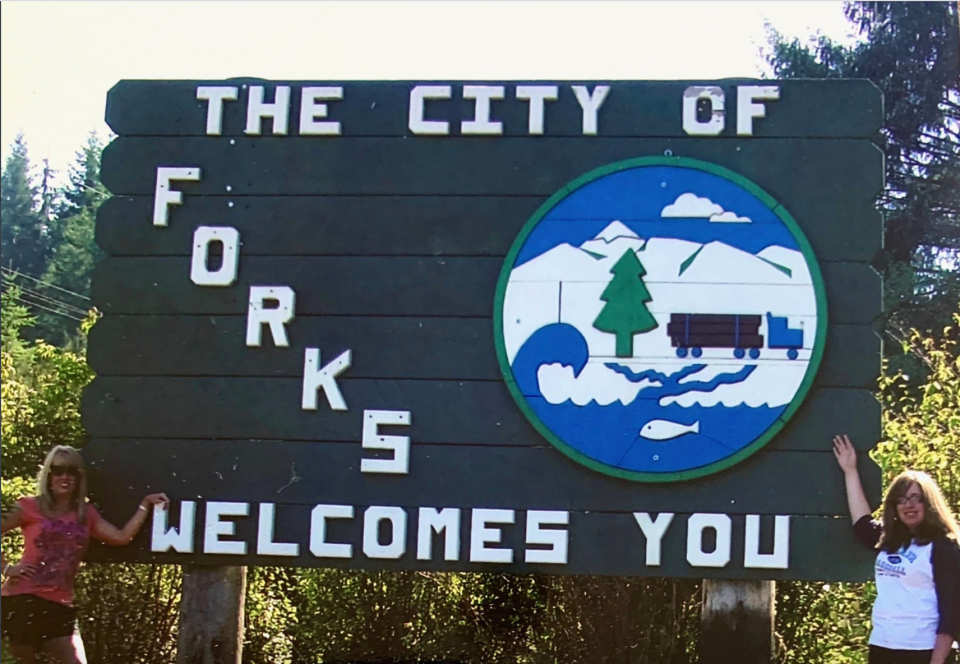15 Women Reflect on What Twilight Meant to Them, 15 Years Later
I looked at the Hanes V-neck, pristine in its plastic pouch. I looked at the shrink-wrapped puff paint.
Could I do it? Could I make a Twilight “TEAM EDWARD” T-shirt that would express the seriousness with which I would give my body to a fictional vampire if he came to life and arrived in my eighth-grade classroom? Would the world finally understand why I HEARTED Edward and did NOT heart Jacob? Could eternal truths be imparted via a men’s medium?
The first book of Stephenie Meyer’s vampire saga Twilight came out in 2005, and for a certain group of people—a diverse, obsessive cohort dominated by young women—it quickly became more important than food, more precious than friendship, more real than our own lives. Twilight sold faster than Harry Potter; the movies and books together grossed billions of dollars; the fandom was heavily female and widely scorned.
This week marks the debut of Midnight Sun—a retelling of the first Twilight book from love interest Edward’s perspective that leaked in 2008, prompting Meyers, who called the leak a “violation,” to write that the work was “on hold indefinitely.” This May she announced its long-awaited release. Fans who first read the saga during free periods and carpools are now 15 years older than they were when they first read their way into the enchanted gloom of Forks, Washington.

Twilight fans
Twilight criticism is nearly infinite and often deserved. But as with all things loved by teenage girls and mocked by the general public, the most relevant critics are the girls themselves. Andrea, a 24-year-old in Melbourne, “devoured” the books as a 12-year-old. (She read the leaked pages of Midnight Sun in a middle school computer lab.) “Then 2010 hit and it was suddenly uncool to like Twilight,” she says. Looking back, the books have plenty of troubling aspects, she thinks, including the influence of Meyer’s Christian, conservative beliefs that weren’t obvious to her as a preteen. But the harsh criticism of the fandom, she says, is suspect. “I think the series deserves to be critiqued but without making female fans feel guilty for enjoying it, which seems to have happened frequently when the movies came out.”
As I grew from Twilight fan to adult critic, seeing the giant black volumes sitting on my childhood bookshelves like infants’ tombstones, I could no longer remember what it was about the books that had left me breathless. What had I found romantic about a girl who sublimates every aspect of her personality for a man who wants to eat her? Why hadn’t I observed that beauty in the world of Twilight is defined as “ivory skin” and “straight, regular features”? Why had I been attracted to the descriptions of Edward Cullen? I imagined Stephenie Meyer settling down to her Windows XP in 2003, thinking, “I am going to describe the sexiest man alive: He's a ginger with pitch black eyes and translucent skin. He will drive a Volvo. He will pretend to be in high school, but secretly he will be 100 years old.”
Was it simply that the books captured my greatest sexual fantasy at the time, which was lying fully dressed next to a man—also fully dressed—and receiving compliments? (This fantasy holds up.)
I called my best friend Katrina, who, just over a decade ago, went with me to a local mall on a school night to hear Stephenie Meyer read from Twilight. “Why were we so obsessed with those books?” I asked her. “At that point in my life what I wanted more than anything was to be seen as something precious and worthy of love and protection,” she says instantly. “You know the point in New Moon where Edward leaves [Bella] in the woods and you just have pages where every single page is just like, ‘October....November…December…?’”
Of course I know exactly what she’s talking about.
“It was so dramatic,” she says, “that I remember where I was when I read it the same way that I remember where I was on 9/11.”
The girls who read Twilight are adults now. Readers who were children when they read the first book have had sex, gotten married, gotten divorced, gotten degrees, come out, transitioned, had children, suffered loss, and considered what it means to be “unconditionally and irrevocably in love.” Glamour asked them to share how Twilight affected them, and what they think of the series with the benefit of years of distance. “Teen girls being predominant fans of the series really irked some people,” Andrea notes.
Holy crow, as Bella would say. Prepare to be irked.

Twilight-bedroom.jpg
Amanda, 22, Stockholm
Amanda runs Twilight Memes, an Instagram page with 18,000 followers
I dove into Twilight as an 11-year-old with an enthusiasm I had never felt before. I was that fan who started rereading the first book the second I had finished the last one. The “criticism” I had seen was always homophobic and/or misogynistic—“Twilight is bad because the sparkly vampires are gay,” or “Twilight is bad because Bella is a boring woman.”
But my views were eventually challenged by a Tumblr post detailing a lot of valid points about the frankly racist aspects of the series, like how according to Stephenie the vampire venom purifies the body and in the process it destroys melanin. [In The Twilight saga: The Official Illustrated Guide, Meyer writes that vampire venom “leaches all pigment from the skin...regardless of original ethnicity, all vampires will be exceptionally pale.”] Or how the Cullens are portrayed as regal white statues, while the Native American wolves are portrayed as dangerous and violent. To me the narrative changed and the real bad guy was slowly revealed to be Stephenie Meyer herself. But Twilight has given me a lot—the series shaped me in many ways. I’ve realized that it's okay to like, or even love, something that is bad, as long as you acknowledge it.
Kirstie, 28, Little Egg Harbor, NJ
I literally dragged my parents to take me to Borders to purchase Twilight as a 14-year-old. I read the entire book in one night. I went to the Twilight soundtrack release party at Hot Topic! No book has ever had quite the effect that Twilight had on me. I could not put it down. Exploring the idea of the supernatural unlocked an entire new world for me and inspired my own writing. It truly changed my life.
Over time my obsession died down. But now I’m having trouble sleeping due to my excitement of the Midnight Sun release. I honestly felt like I was alone in my love of Twilight over the years and now I feel silly for thinking so. I am so ready for this to destroy my life again.
Emily, 27, Bountiful, UT
Emily Mensing is the cohost of the (fabulous) podcast “Remember Twilight?”
At this point in my life there are no aspects of my day that are not somehow related to Twilight. I was 14 when I first read it, and I had a lot of undiagnosed anxiety which led me to behave like an adult rather than a child. Bella is this way too. She showed me that it was okay to not relate to the people around me and that there were people who would accept me just as I am. Bella came to me at a time in my life where I felt so out of place and like nothing special would ever happen to me. It was amazing to have this world I could jump into any time and walk alongside her. Now that I’m an adult, coming back to Bella and to Twilight is just like coming home and visiting old friends.
Kristina, 31, North Andover, MA
What young woman doesn’t want some hot, eternally young man to be devoted to her like no one else? I read the books when I was 20, and for me, that particular part of the story was captivating. Devotion like Edward’s is hard to find in men, especially in your 20s!
I’ll be honest: I think Twilight gave me this idea about what real or ideal love looks like that is not accurate at all. These days I think Edward’s devotion is kind of creepy. I also wish Bella had been a stronger person on her own without attachment to some guy. For me the series is kind of like a guilty pleasure that has sort of lost its sweetness over time. I think my palate has changed.

Twilight-girl
Anonymous, 18, Alberta, Canada
Anonymous runs the Instagram account Twilightfactsig, which has over 5,000 followers.
When I got bullied at school in junior high, I started chilling in the library and reading. That’s how I found Twilight. It made me feel less lonely at school, like I was included in an online family where I made a lot of friends. I still feel good about the series, but as I grew older, I could see Stephenie Meyer’s biases in her writing—not wanting any people of color cast in the movies, having the vampire venom leaching all pigmentation from the skin making all vampires extremely white, using the Quileutes without paying them. But her purpose in writing the books was for entertainment and lots of people were entertained, so in that sense she succeeded.
Cara, 30, New York City
I got tickets to TRL the day Rob Pattinson was on and there may or may not be footage of me “fangirl-ing” on national TV. I think that the books we read really do become part of who we are. And there are times when—if I’m lucky—I’m able to draw on those literary experiences in my own life. I think Twilight and the fandom it started made me aware of the type of woman I did and did not want to be. The story helped me form a stronger sense of self, believe it or not.
Imogen Russell Williams, 38, London
Russell Williams reviewed Twilight in 2009 in the Guardian. She had read the book for fun, and panned it (rather gloriously) in the piece, resenting “the perfectly good hours it’s thieved from my precious, finite life” and referring to the heroine as “a clumsy, selfish nincompoop with the charisma of a boiled potato.”
I won’t read Midnight Sun unless I'm paid to—it’s in the past for me, and I’m not especially interested. I was annoyed by so much about the Twilight series when they first came out, yet I was impelled to continue reading them. I felt reluctant admiration for their insidious appeal. I don’t feel much for Twilight these days. I still deplore a lot about Edward’s relationship with Bella (breaking into someone’s room to watch them sleep is not a romantic ideal), but I have other young adult books to hate-read.
J’Neia, 24, Baton Rouge
To say I was obsessed with Twilight is a vast understatement. When the DVD came out, I made my parents watch it with me twice in one weekend, all the while telling them it deserved an Oscar. But the older I’ve gotten the more I realize how problematic the series was. Edward had some abusive and controlling tendencies (watching Bella sleep, taking the battery out of her car so she couldn’t see Jacob, following her when she went to Seattle, etc). Their relationship was codependent to the max and was not healthy at all. I can recognize its flaws more clearly now than I did when I was younger. But 11-year-old me is living for the Twilight Renaissance happening right now.

Twilight-girls
Abby, 44, Indianapolis
Listen, I knew the series was low-key problematic from the jump, but I’d be lying if I said that stopped my enjoyment of it. I read the books when I was 31 or 32, and my fellow Gen X Twi-hards would laugh about the fact that the youth of today was obsessed with a virginal vampire couple, whereas we were all about books like the Flowers in the Attic series which were—at their core—rooted in literal incest. Oh how the times had changed! Do I plan to read Midnight Sun? To quote Mr. Big: Abso-fucking-lutely. #TeamEdward4Eva
Professor Marijane Osborn, 85, Northern California
The UC Davis professor emerita coedited the book of essays The Twilight Mystique: Critical Essays on the Novels and Films.
Will I read Midnight Sun? No, I just can’t go back to that. I was impressed by the way Stephenie tied everything together with the protective mental bubble that she had Bella throw over her friends in the last book, blown up big from the way that Edward could not penetrate her mind that first day he encountered her at school. I think that was very well done—it was an amazing trick going across all those books, clever and tidy. But surely anything coming after it messes up that great narrative arc. Anyhow, I’m on to other things and unlikely to read the pomegranate book.
Milka, 29, Oulu, Finland
I can honestly say that Twilight made me the reader I am today. Since I was a kid, I have tended to get deeply into things I am interested in and was sometimes made to feel like there is something wrong with caring so deeply about something. With Twilight, I found a community. As I have read more, educated myself and just generally grown up, I have come to realize that many of the elements in the books that I once considered romantic and swoon-worthy are not quite that after all. And because of the representation issues with the books, I probably wouldn’t recommend them to a 15-year-old growing up in 2020. But Midnight Sun is my most anticipated book of the year—I’m looking forward to a very nostalgic trip back to Forks.
Maren, 41, Salt Lake City
Maren Abercrombie is the cohost of the (addictive) podcast “Remember Twilight?”
I can honestly say that one of the greatest sources of joy in my life is the Twilight saga. These days I love Twilight more than I ever have. As a mother, I look at Bella through different eyes. I see her as a child who yearns for love and direction and finds it in the most unexpected place. I look at Edward as an orphan who has never known where he belongs until he meets Bella and their lives become forever entwined. I plan to read Midnight Sun multiple times this month, at least.

Twilight-women-Forks
Samantha, 24, Kissimmee, FL
Twilight for me means friendship and fantasy, and thinking about how our choices define us. The books helped solidify my lifelong love of reading. I coerced my mom into reading them as soon as I finished them, and she was also hooked. It was an amazing way for the two of us to bond—we spent years reading the books, going to all the midnight movies, and even traveling to Forks for my 13th birthday. These memories are so special, especially now that we live across the country from each other...even though she is Team Jacob (and I am Team Edward for life!).
Amy Clarke, Ph.D., late 50s, Northern California
The UC Davis lecturer coedited the book of essays The Twilight Mystique: Critical Essays on the Novels and Films.
I was teaching a course on Harry Potter when someone in our university press office asked me if I would be willing to become an “expert” on Twilight—she thought it was going to be a cultural phenomenon. She was right, of course. Shifting to Edward’s perspective in Midnight Sun is an interesting tactic, but it really diverts from what I loved about Meyers’ audacity—in the series we watch Bella become more and more empowered. She’s essentially a Marvel Universe–level character by the end of the fourth book, except the books are about her whereas most comic books are about males. The author herself grows in power and awareness just as Bella does: It was really an interesting thing to watch as the fan base and the franchise’s economic power grew. How this all fits into a story about a vampire boy finding love, well, we’ll see.
Marisa, 22, Cheshire, CT
Twilight and its saga took over my life when I first read the books. My mom and I ended up reading the series at the same time. In some ways, it was my first “book club” experience, getting to share them with her. (I went to see Eclipse in theaters with my dad, which I regretted almost immediately.) Going back to Forks feels like stepping back into a time where learning algebra and deciding between Team Edward and Team Jacob were truly my biggest concerns. It’s a secure place to be, even for only a few hours. Maybe that’s why reading Midnight Sun has become more and more appealing. In a world where so much is uncertain, it feels safe to fall back into the well-known universe of vampires and werewolves.
These interviews have been edited and condensed for clarity.
Jenny Singer is a staff writer for Glamour and a conflicted member of #TeamEdward. You can follow her on Twitter.
Originally Appeared on Glamour

